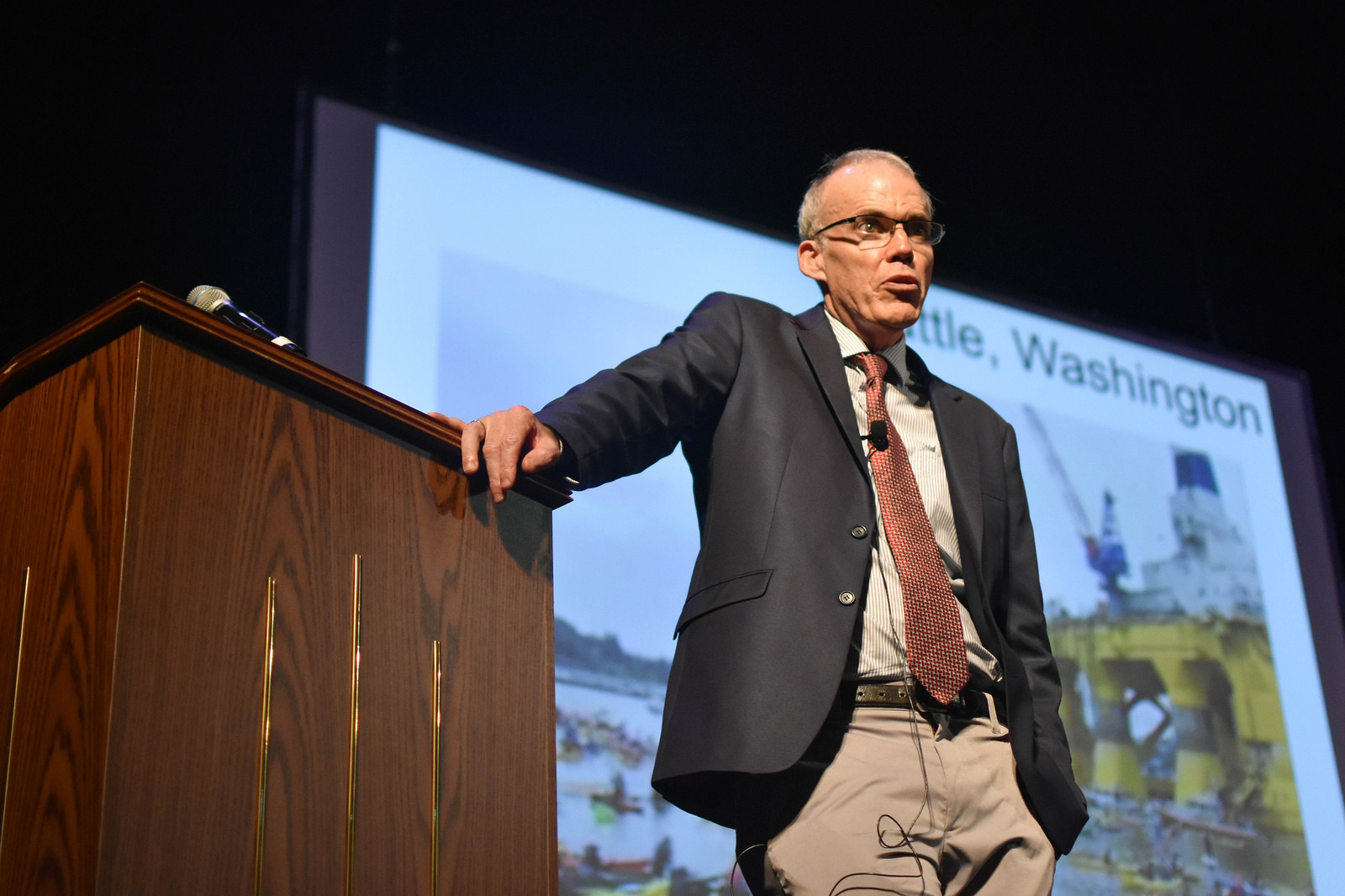Published on
Bill McKibben explained the impact of increasing carbon emissions on the global climate and explored solutions to slowing the trend

Bill McKibben responds to an audience member’s question at his lecture on Oct. 4 in Jesse Hall. The screen behind him shows demonstrators blocking an oil rig from leaving harbor. McKibben called them “kayak-tivists.” Photo by Eleanor Hasenbeck | Bond Life Sciences
Bill McKibben responds to an audience member’s question at his lecture on Oct. 4 in Jesse Hall. The screen behind him shows demonstrators blocking an oil rig from leaving harbor. McKibben called them “kayak-tivists.” Photo by Eleanor Hasenbeck | Bond Life Sciences
Eleanor Hasenbeck | Bond Life Sciences Center
Climate writer and activist Bill McKibben spoke to a packed house at the Missouri Theater Wednesday, October 4. With more than 300 people in attendance, McKibben discussed the changing climate, its impacts and his activism. The lecture was part of the Lloyd B. Thomas Lecture & Performance Series.
“It’s happened a hell of a lot faster and pinched a hell of a lot harder than we thought it would,” said McKibben of climate change.
McKibben said the signs of a warming planet first became apparent in the 1970s. Today, the oceans have become 30% more acidic as the world’s salt water takes in carbon dioxide from the atmosphere. Hurricanes are breaking records in the amount of rainfall and monetary damage they bring, McKibben said.
The solution lies in consuming less and using alternative energy, he continued. Last year, half of Denmark’s energy was generated by wind. Solar panels are so affordable now that homes in east Africa once lit by kerosene lanterns are powered by solar panels on the roofs of small homes.
“If we actually wanted to, we could move with real speed to make this transition,” McKibben said.
Why aren’t we then? McKibben blames the fossil fuel industry. Internal communications from Exxon Mobil show the corporation took steps to protect its drilling rigs from rising sea levels and increasing severe weather at the same time it was working to block regulations that would decrease carbon emissions.
“It took me far too long to figure out that we were not in argument at all,” McKibben said, referring to the so-called debate as to whether a warming climate is caused by human impact. “We were in a fight, and a fight is always about money and power. The fossil fuel industry was the richest and the most powerful industry on the planet, and the fact that it had lost the argument made very little difference to it. It was winning the fight day after day after day.”
But for all the doom and gloom surrounding climate change, McKibben still has hope that we can slow the process. He founded 350, an organization working to use grass roots movements to oppose fossil fuels. According to 350.org, 350 is named after an acceptable concentration of carbon in the atmosphere, 350 parts per million. Demonstrations through the organization have taken place across the world, from American cities to places most susceptible to rising sea levels, like the Maldives and Haiti.
At Bond LSC, some are taking their own steps to slow down the rate of the world’s warming. Cheryl Rosenfeld studies Bisphenol A, a chemical component of many plastics. She recently installed solar panels on her home, and she earns credits for the energy they generate. She uses reusable bags at the grocery store to reduce the waste generated from plastic and the fossil fuels consumed to produce them.
“Each of us could be making the decisions in our own lives that can make a change,” Rosenfeld said. “If we all come together like that, we can make an impact.”
There are several ways to reduce your own carbon footprint:
- Use renewable energy to power your home. You can find utilities companies that generate at least half their power through renewable energy
- Weatherize your home to make your heating and cooling systems more efficient.
- Invest in energy-efficient appliances. Use a power strip or unplug your devices when they are fully charged or not in use.
- Reduce food and water waste. About 10 percent of American energy goes to food production, and about 40 percent of our food is wasted. You can save money and energy by eating what you buy.
- Install solar panels on your home. Right now, you can earn a 30 percent federal solar tax credit. The city of Columbia also offers rebates to encourage utilities customers to use solar energy and invest in more energy efficient utility systems. The city also maintains a list of solar providers that meet its requirements for rebates.
The most important thing, said McKibben, is inspiring policy changes like carbon taxes or renewable energy programs.
“We’re so far deep into this problem that we can’t solve it one person at a time. What we need is a change in policy, said McKibben. “The best individual action is not to be an individual. It’s to come together in movements big enough – that doesn’t take an enormous movement. It takes between four or five percent of people coming together in a movement to force change in policy that might give us some chance.”
Bill McKibben is author of sixteen books about environmental issues and founder of 350. He frequently contributes articles and editorials to organizations such as the New York Times, the Guardian and Mother Jones. You can learn more about his writing and activism at his website.
Bond Life Sciences Center sponsored the 2016 LSSP Symposium, Confronting Climate Change, which brought experts in the field to MU to speak about its pressing issues.